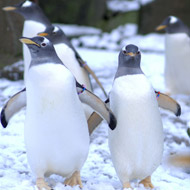
Production team visited Zoo during nesting season
Monty and Mabel, stars of this year's John Lewis Christmas advert, were partly inspired by penguins at Edinburgh Zoo.
The production team from the advertising agency spent day at the zoo earlier this year, observing the behaviours of the penguins as they waddled and porpoised through their enclosure.
During their visit, the team discussed the behaviour and movements of penguins with the keepers and also made short recordings which were used to develop complex CGI technology to create the realistic onscreen penguin characters.
Staff at the Zoo were very excited to hear that their penguins had inspired the much-anticipated advert.
Dawn Nicoll, senior keeper of penguins at Edinburgh Zoo, said: "Although Monty and Mabel are Adélie penguins, they have the same behaviours and mannerisms as the Gentoo penguins we have here at the Zoo."
“When the production crew came to study our penguins for a day, the birds definitely put on a great show! We have a large colony here at Edinburgh Zoo with a few big personalities and famous residents who create a dynamic group. Some of Monty’s behaviours in the advert mirror the behaviours which can be seen in our colony at Penguins Rock. For example, the movements as penguins, porpoise, jump out of water, waddle, make a trumpeting call when throwing back their heads, sleep and lie on their belly, flap their wings and how they eat fish from our hands. The crew were particularly interested in capturing the exact head movements of the penguins which they did a great job in recreating in the advert.
“Nesting season was in full swing at the time and it is possible that the affectionate behaviours displayed by our penguins inspired some of the more emotive interactions in the advert. Penguins could be seen courting similar to the loving behaviour displayed at the end of the advert when Monty and Mable meet. Male penguins were borrowing pebbles from each other to impress their other half and build their own perfect nests - an interesting and fun movement to watch which was reflected in the advert when Monty helps Sam build a toy brick house.”
To watch the John Lewis Christmas advert visit: www.youtube.com/watch?v=iccscUFY860
Image (C) Edinburgh Zoo



 The veterinary mental health charity Vetlife is inviting the veterinary community to join it for a sponsored cold-water dip.
The veterinary mental health charity Vetlife is inviting the veterinary community to join it for a sponsored cold-water dip.